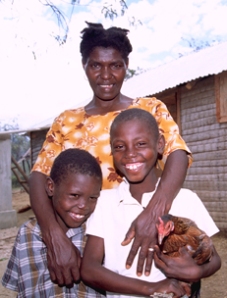This Mother’s Day, we’re celebrating the role that mothers play, not only in their households but also as cornerstones of their communities and drivers of change.
For example, in the Care Group approach, mothers are empowered to be community health leaders in their villages. Elected by their peers, these “Leader Mothers” are trained to promote important healthy behaviors by visiting and teaching other mothers in their neighborhood. Health messages target critical—though often neglected—health behaviors such as breast feeding, hand washing, oral rehydration therapy for diarrheal illness, and other forms of preventive care such as sleeping under bed nets to prevent malaria. Care Groups are currently being implemented by 24 non-profit organizations in 21 countries in South Asia, Sub-Saharan Africa, and Latin America.
Community and village health workers play important roles in the United States and abroad. They provide health education and other essential—even life saving—treatments and health services to their friends, family, and neighbors. There are numerous examples of how community health workers (many of whom are also moms) work with mothers in programs run by BRAC, Nurse-Family Partnership, and JHPIEGO.
The Impact of Investing in Mothers

Photo by Darcy Kiefel. Image provided by Fonkoze.
Investment in programs for mothers not only improves the welfare of moms but also advances the livelihood of their families and communities. Here are a few examples of such investments:
- Lowered maternal mortality and improved child survival: Programs that provide prenatal care and safe deliveries to pregnant women result in fewer annual maternal deaths due to pregnancy complications, as well as fewer infant deaths.
- See more details in our case study on the Comprehensive Rural Health Project at Jamkhed.
- Increase in food and housing security and child schooling opportunities: Programs that provide women and mothers with productive physical assets, skills, confidence and social networks, shelter, a stipend, and access to healthcare “graduate” them into more income-earning activities that enable them to sustain themselves and their families.
- See more details in our case study on Fonkoze’s Graduation Model.
